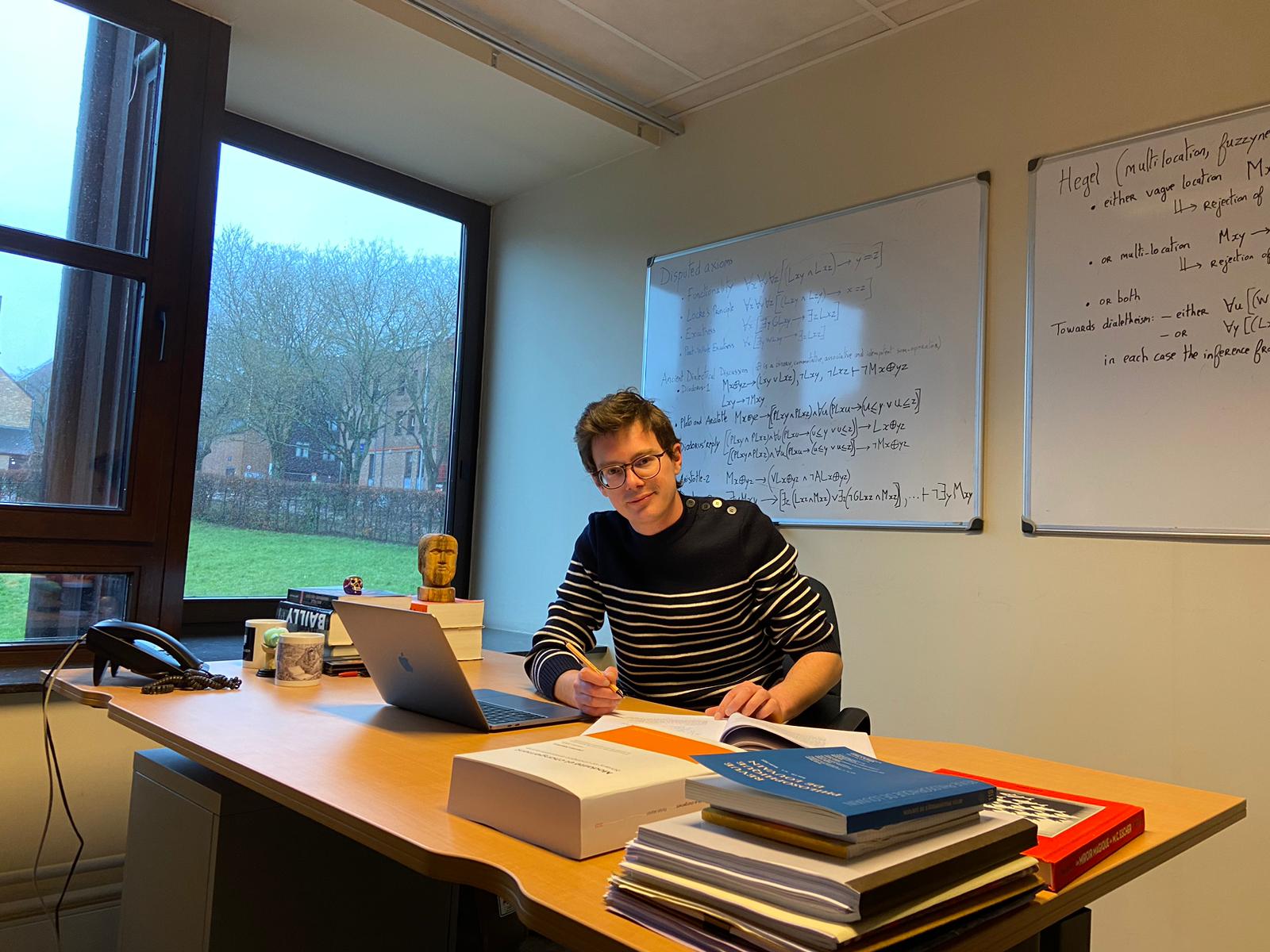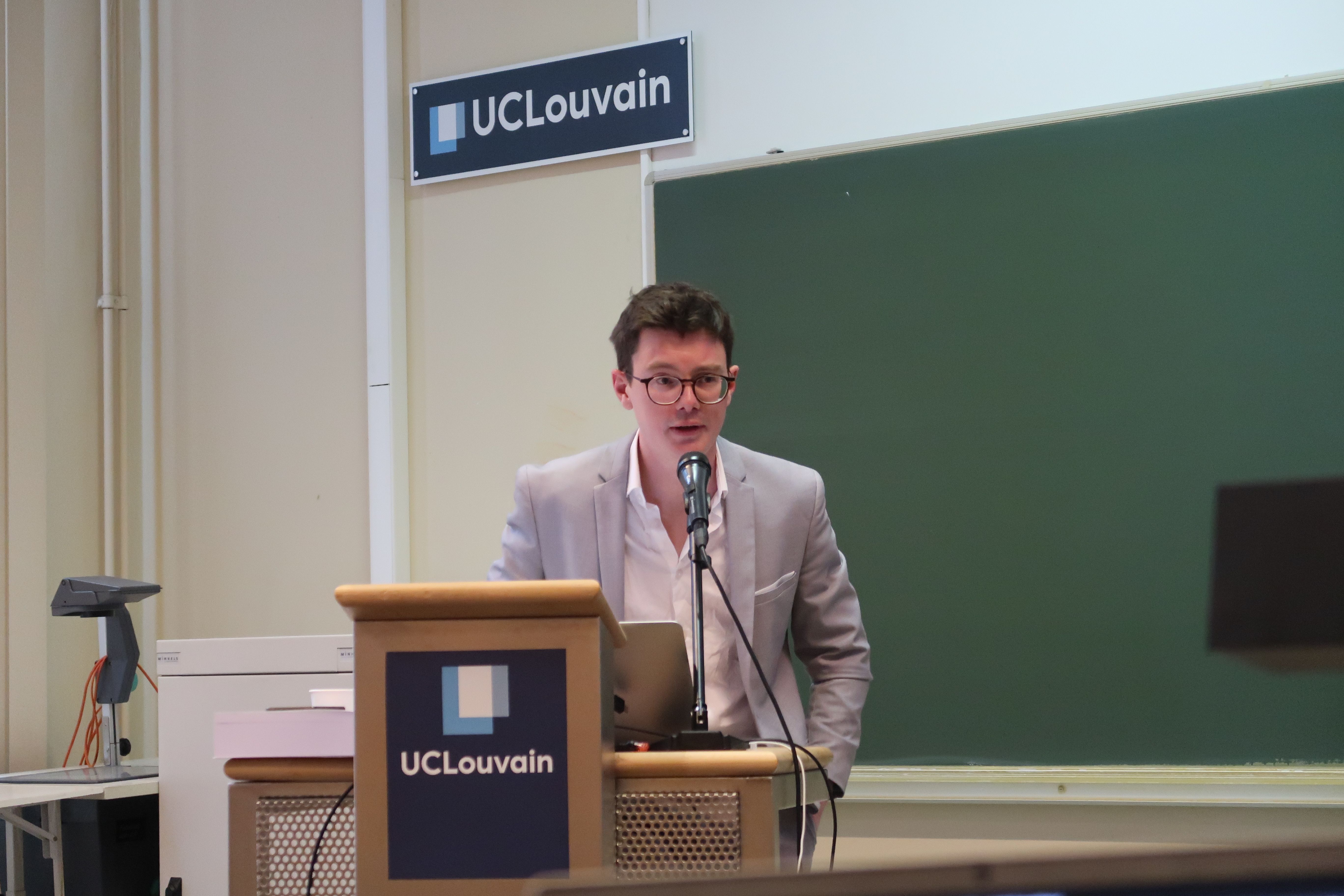I am a philosopher and an historian of ancient philosophy. My research interests are in theoretical philosophy and ancient philosophy, mainly on metaphysics and philosophy of logic. I hold a PhD in philosophy from the Université catholique de Louvain (UCLouvain). I devoted my doctoral dissertation to an examination of the function of modalities into Aristotle’s kinetics, notably in the light of the ancient commentators and of the contemporary works on modalities. Since 2017, I am an assistant (teaching and research fellow) at the Institute of Philosophy of the Université catholique de Louvain.

My research interests in history of ancient philosophy and in contemporary metaphysics go back to my student years in Rennes (where I obtained at the same time a bachelor’s degree in History and another in Literature at Université de Rennes 2, plus a bachelor’s degree in Philosophy at Université de Rennes) and Paris. After graduating both in philosophy of science (joint MA at Université of Paris-Cité, École Normale Supérieure of Paris, and École Polytechnique) and in history of philosophy (MPhil at Université Paris-Sorbonne), my own research has been organized around two themes: ancient logics and metaphysics (mostly by working on Aristotle) and contemporary philosophy (mostly in logic and modal metaphysics). Although both themes are clearly distinct and require different skills, they share a common focus on abstract philosophical matters. These two aspects were intricated in my PhD dissertation on Aristotle’s philosophy of change and modalities (done at Université catholique de Louvain (UCLouvain)).
My 1000-page doctoral dissertation entitled Modality and Change: δύναμις and Aristotle’s kinetics, which I have defended in March 2023, was devoted to an in-depth study of Aristotle’s modal metaphysics and Aristotle’s metaphysics of change. In addition to the usual tools of the historian (philology, textual exegesis, confrontation with the scholarly literature, etc.), I used a lot of contemporary works in logic and metaphysics to interpret and discuss the positions of both Aristotle and his opponents (for instance, the Megaric dialecticians, like Diodorus Kronus, who were forerunners of Humeanism). Parts of the dissertation either have already been published, or will be published soon in peer-reviewed journals and collected volumes.
During my six years at UCLouvain, while doing my PhD, I had the opportunity to present my works on Aristotle and ancient philosophy all over the world to the greatest audiences (Paris, Lille, Madrid, Leuven, Dublin, Houston, Los Angeles, Athens GA, etc.), but also to co-organise and participate in scientific activities in contemporary philosophy (reading seminars on Timothy Williamson and Kit Fine, seminars in philosophy of mind, successful proposal of Francesco Berto for the chair of excellence of the Institute of Philosophy of UCLouvain, successful discussion with academic editors for reissuing the last book of Richard Routley/Sylvan, etc.). Furthermore, I am a member of several academic associations both in history of ancient philosophy (International Plato Society, International Society for Neoplatonic Studies, International Society for Socratic Studies, Sociedad Ibérica de Filosofía Griega) and in contemporary philosophy (Société de Philosophie Analytique, Belgian Society for Logic and Philosophy of Science).
Thus, along more than a decade, I have patiently acquired expertise both in history of philosophy and in contemporary philosophy.
To end this presentation, I wish to point out that I attach great importance to philosophy outreach and communication. In addition to many talks in scientific congresses and workshops and to my teaching activities at UCLouvain (where I have taught methodology of argumentation, epistemology, philosophy of language, logic, philosophy of science and metaphysics), I have talked to public audiences, from secondary schools to student and professional audiences in Belgium and France (I also once organized with two other philosophers a biweekly reading seminar on philosophy of mind for an audience composed of students of exact sciences, engineers, CEO in AI industry, and other professionals). The topics of my public talks range from Grelling’s Paradox, Paraconsistency and Meinongianism to Gödel’s Platonist mysticism. Recently, I also had the opportunity to be a guest on a podcast in order to present the philosophical theories of well-being and happiness.

Florian Marion
Philosopher & Historian of Philosophy at UCLouvain
